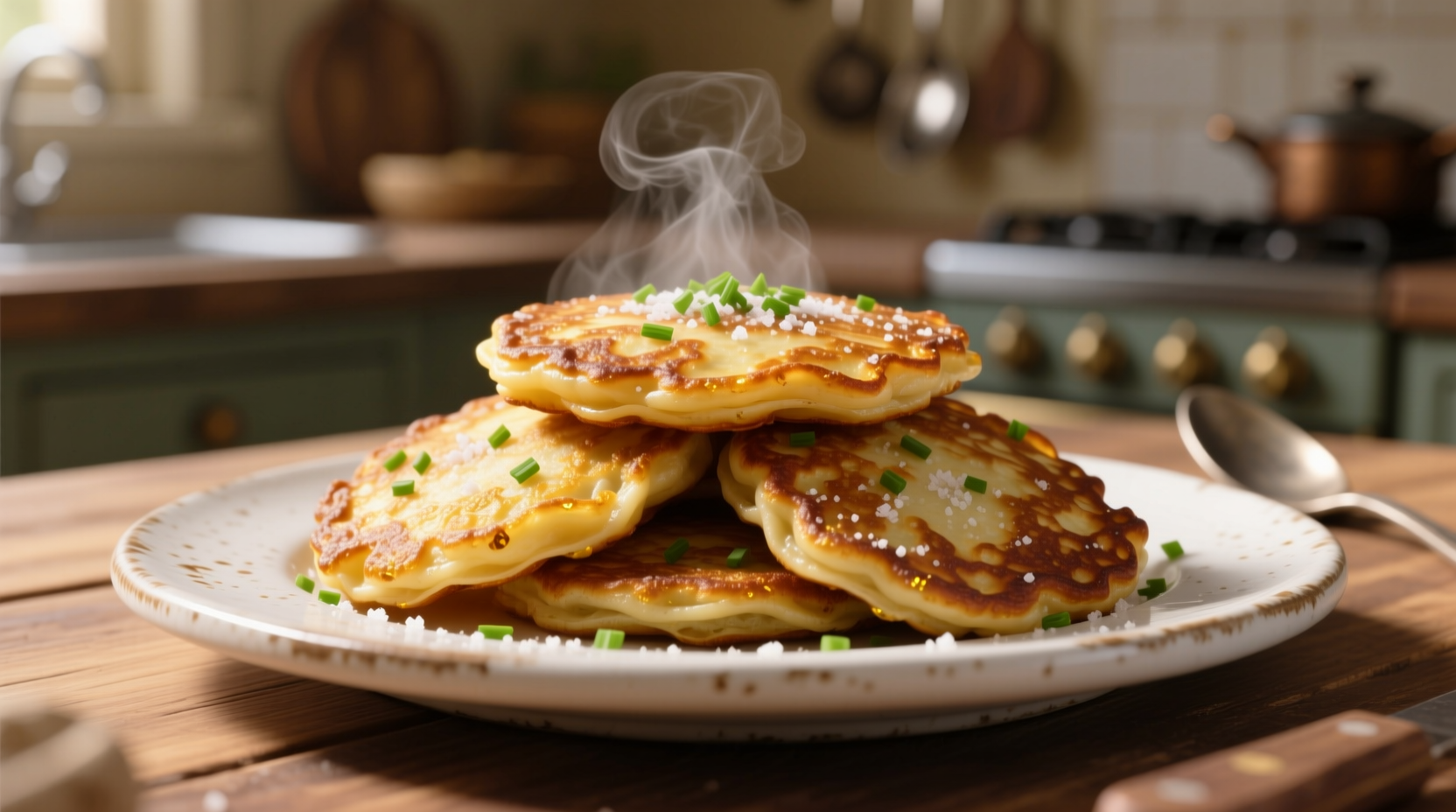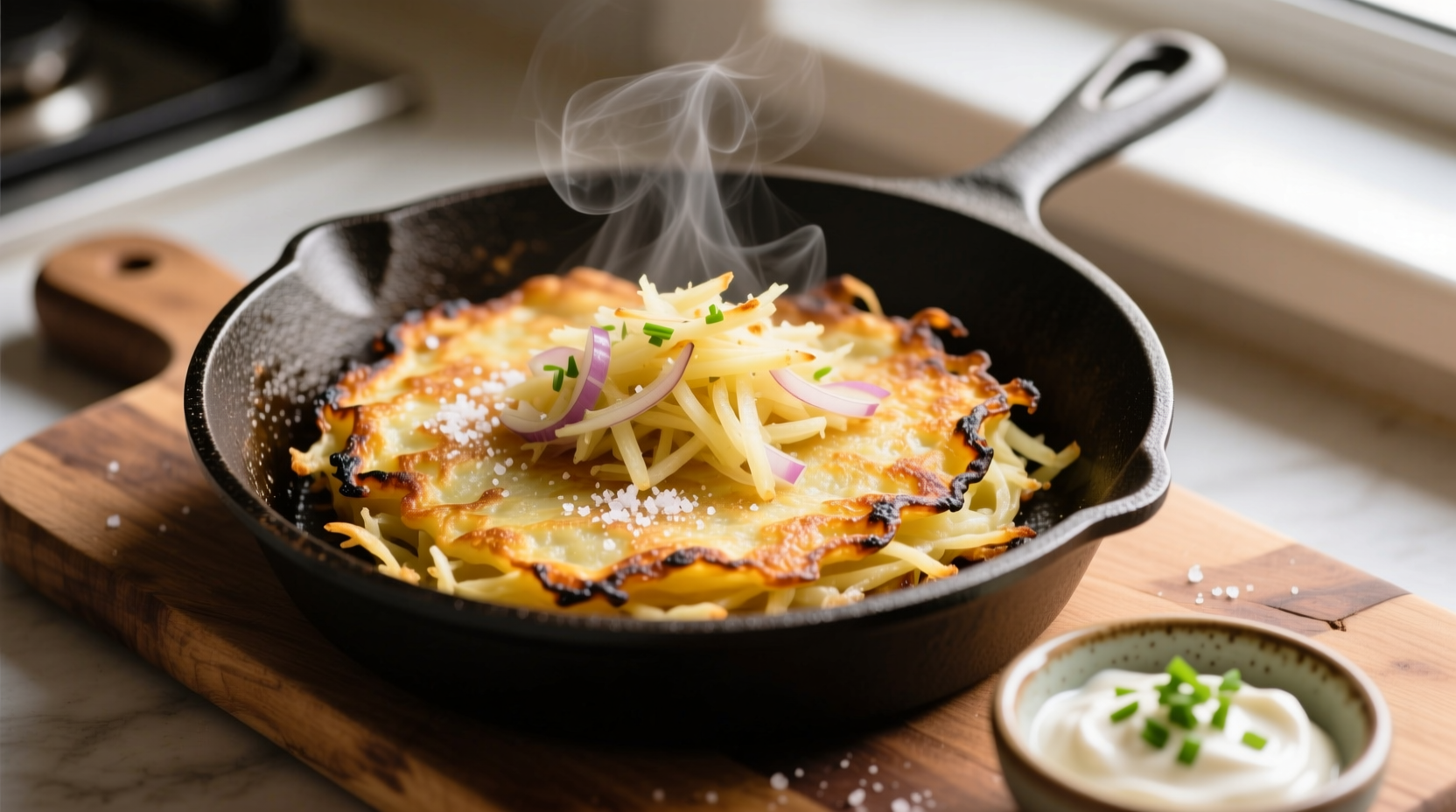Why This Simple Potato Pancake Recipe Works
Most home cooks struggle with potato pancakes because excess moisture causes them to fall apart or become greasy. This streamlined method solves that problem through proper potato preparation techniques validated by culinary science. According to the USDA Food Safety and Inspection Service, removing excess starch and moisture from potatoes not only improves texture but also reduces acrylamide formation during high-heat cooking.

Essential Ingredients for Foolproof Results
Unlike complicated recipes that require specialty ingredients, this version uses pantry staples:
- 2 lbs russet potatoes (about 3 medium), peeled
- 1 large yellow onion
- 2 large eggs, beaten
- 3 tablespoons all-purpose flour
- 1½ teaspoons salt
- Freshly ground black pepper to taste
- Vegetable oil for frying
| Ingredient | Why It Matters | Common Substitutions |
|---|---|---|
| Russet potatoes | High starch content creates ideal binding | Yukon Gold (less crispy) |
| Yellow onion | Natural sugars enhance browning | Shallots (milder flavor) |
| All-purpose flour | Creates structural integrity | Chickpea flour (gluten-free) |
Step-by-Step Preparation Process
1. Proper Potato Preparation (The Critical Step)
Grate potatoes using the large holes of a box grater or food processor. Immediately submerge grated potatoes in cold water for 5 minutes. This crucial step, recommended by the University of Minnesota Extension, removes excess starch that causes discoloration and improves texture. Drain and squeeze potatoes thoroughly using a clean kitchen towel—this moisture removal is non-negotiable for crispy results.
2. Mixing the Batter
Combine squeezed potatoes, grated onion, eggs, flour, salt, and pepper in a bowl. Mix gently until just combined—overmixing creates tough pancakes. The batter should hold together when pressed but not be overly wet.
3. Perfect Cooking Technique
- Heat ¼ inch vegetable oil in a heavy skillet over medium-high heat (350°F/175°C)
- Form ⅓ cup portions into ½-inch thick patties
- Fry 3-4 minutes per side until deep golden brown
- Drain on wire rack (not paper towels) to maintain crispness
- Season with additional salt immediately after cooking
Troubleshooting Common Problems
Even with this simplified recipe, issues can arise. Here's how to fix them:
- Soggy pancakes: Potatoes weren't squeezed dry enough. Use a clean dish towel and apply firm pressure.
- Falling apart: Insufficient binding ingredients. Add 1 extra tablespoon flour to the mixture.
- Uneven browning: Oil temperature too low. Use a thermometer to maintain 350°F.
- Greasy results: Oil not hot enough before adding pancakes. Test with a small batter drop.
Serving Suggestions and Variations
Traditional Eastern European potato pancakes pair perfectly with sour cream and applesauce. For modern twists:
- Add 1 teaspoon smoked paprika for depth
- Mix in 2 tablespoons fresh dill or chives
- Top with smoked salmon and crème fraîche
- Serve alongside roasted beet salad
According to culinary historians at the International Association of Culinary Professionals, potato pancakes evolved from Eastern European latkes as potatoes became widely available in the 18th century. This simplified version maintains authenticity while removing unnecessary complexity.
Storage and Reheating Instructions
Store cooled pancakes in an airtight container with parchment paper between layers for up to 3 days. Reheat in a 400°F oven for 8-10 minutes to restore crispness—microwaving creates sogginess. Freeze uncooked patties between parchment paper for up to 3 months; cook directly from frozen with 1-2 extra minutes per side.
Frequently Asked Questions
Can I make potato pancakes without eggs?
Yes, substitute eggs with 2 tablespoons of aquafaba (chickpea brine) or 1 tablespoon of cornstarch mixed with 2 tablespoons water. The texture will be slightly less cohesive but still delicious.
Why do my potato pancakes stick to the pan?
This happens when the oil isn't hot enough before adding pancakes. Wait until oil shimmers (about 350°F) and avoid moving pancakes during the first 2 minutes of cooking to allow proper crust formation.
How can I make these gluten-free?
Replace all-purpose flour with an equal amount of chickpea flour or a gluten-free all-purpose blend. Potato starch (2 tablespoons) also works well as a binder in gluten-free versions.
What's the best potato variety for crispy pancakes?
Russet potatoes provide the crispiest results due to their high starch content. Yukon Golds work but produce slightly softer pancakes. Avoid waxy varieties like red potatoes which contain too much moisture.











 浙公网安备
33010002000092号
浙公网安备
33010002000092号 浙B2-20120091-4
浙B2-20120091-4